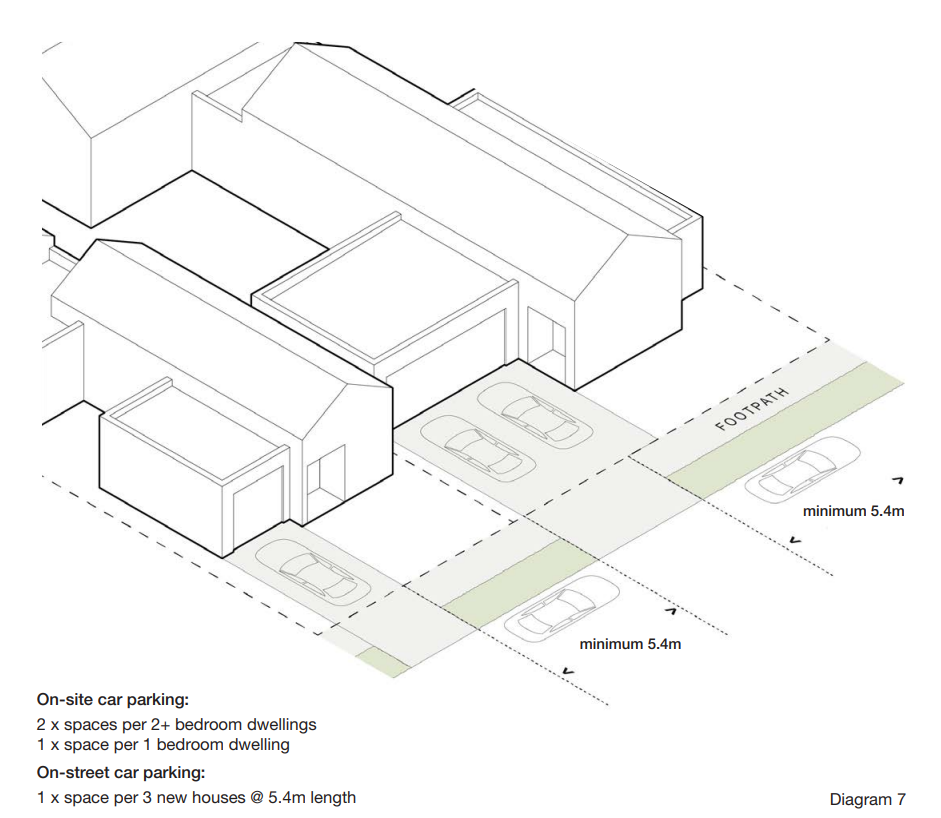
VANGUARD - Expressing the viewpoint of the Communist Party of Australia (Marxist-Leninist)
For National Independence and Socialism • www.cpaml.org
(Above; SA Govt.proposal for solving urban infill car parling crisis. www.plan.sa.gov.au)
In the 1970s, there was an Australian made film "The Cars That Ate Paris", directed by Peter Weir, which was about the prime place of cars in lives of Australians in the fictional small town of Paris, and the unexpected impact of cars on communities.
Now in 2025, Australians living in capital cities in particular are battling the consequences of cars clogging urban streets.
Nowhere is this more of a problem for people than in Adelaide which used to be called the Detroit of Australia because of the primacy of cars as a means of necessary transport. The primacy of cars as a means of transport in Adelaide intensified in the late 1950s and early 1960s when the political influence of oil companies like Shell and BP, and US car multinationals General Motors and Chrysler and the car component industry led to the state government dismantling the city and suburban public transport network.
Locally made General Motors Holdens and Chrysler Valiants filled the expanding suburbs and every quarter acre housing block and even semi-detached housing trust dwellings had ample room for a garage to park the car, with room for another one in the driveway.
There was little need to park the car in the street, leaving room for visitors to park their car in the street right outside the house of the friends they were visiting.
The size of the "average" Holden and Valiant meant that even when cars were parked in suburban streets, there was plenty of room for a reasonable traffic flow of passing cars.
Fast forward to 2025 and the situation has completely changed.
The local car industry was shut down by the car multinationals who then made profits from Australians by marketing imported larger and larger cars (commonly called SUVs) to replace the previously locally made ones.
At the same time, governments and property developers saw an opportunity to build at least two new dwellings on properties in the suburbs that previously had one house. These new dwellings each have an attached garage but often the garage was too small for the larger imported SUV type cars!
An additional problem in 2025 is that many of the new smaller dwellings have young adult children of the parents still living at home and they all have their own car. Inevitably this has led to many suburban streets being clogged with parked cars and in some cases no room for all the residents of a street being able to find a car park in front of their actual home!
To add insult to injury the ABC radio reported that the car multinationals have a vested interest in marketing large cars imported into Australia to offset the trend in other "developed" capitalist countries for people's preference for smaller EV and hybrid cars.
The South Australian government has just announced a proposal to legislate for property developers to be required to build new dwellings with larger garages to accommodate the large cars that the multinational car companies dump on the Australian market.
The Government has gone one step further and proposes that every new dwelling must have a minimum number of car spaces on a new dwelling based on the number of bedrooms in the place!
The developers, represented by the Property Council have said this will increase the cost of housing which is not the response the government wanted at a time when people, especially young people, have the choice of renting forever or buying a new home that will cost at least eight times their household income.
The government solution is a band aid solution at best as it does nothing to alleviate the current problem in established suburbs where parked cars make it impossible for a reasonable flow of traffic along the street without risk of a head on collision with a car coming in the opposite direction with a stressed - out driver in a hurry to get to or from work or pick up the children at the local school.
Since the multinationals successfully pressured the SA government to close down the suburban tram network and also reduce the train network, no government in SA and perhaps in other cities as well has planned a public transport system adequate for the ever-expanding suburbs.
More recently governments of Labor and Liberal have said that "urban infill" is the way to solve the housing crisis and the developers chime in by demanding that high rise apartment living at various hubs across the city suburban limits is the way to go. The problem with high rise apartment living for people is that there is an inadequate public transport system in most of the suburbs so the people who have no choice but to live in a high-rise apartment will need a car for necessary travel and of course somewhere to park the car when they are at home!
Multinational car companies are continuing to flood the Australian market with large cars with competition between the multinationals for market share as fierce as ever.
The issue of cars clogging suburban streets is linked to the problems of affordable housing, inadequate public transport and poor social infrastructure in urban communities. These are all problems that have existed under capitalism in Australia in one form or another for generations.
The band aid solution proposed by the current SA government is an example of the impotence of parties of capitalism in solving basic problems of living day to day that people face. The Premier Malinauskas may have the best intentions in solving these problems, but he will not succeed due to the nature of the capitalist system that he attempts to administer.